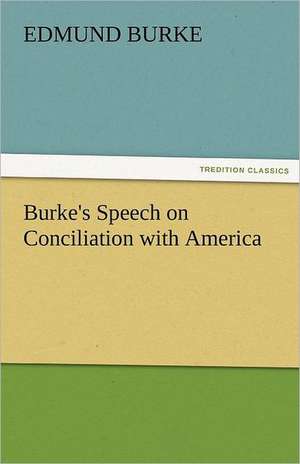Burke's Speech on Conciliation with America
Autor Edmund Burkeen Limba Engleză Paperback – 31 oct 2011
| Toate formatele și edițiile | Preț | Express |
|---|---|---|
| Paperback (4) | 45.77 lei 3-5 săpt. | |
| CREATESPACE – | 45.77 lei 3-5 săpt. | |
| CreateSpace Independent Publishing Platform – 6 dec 2015 | 94.53 lei 3-5 săpt. | |
| Alpha Editions – 11 apr 2022 | 77.49 lei 6-8 săpt. | |
| TREDITION CLASSICS – 31 oct 2011 | 131.11 lei 6-8 săpt. |
Preț: 131.11 lei
Nou
Puncte Express: 197
Preț estimativ în valută:
25.09€ • 26.25$ • 20.84£
25.09€ • 26.25$ • 20.84£
Carte tipărită la comandă
Livrare economică 03-17 aprilie
Preluare comenzi: 021 569.72.76
Specificații
ISBN-13: 9783842459380
ISBN-10: 3842459386
Pagini: 112
Dimensiuni: 129 x 198 x 6 mm
Greutate: 0.12 kg
Editura: TREDITION CLASSICS
ISBN-10: 3842459386
Pagini: 112
Dimensiuni: 129 x 198 x 6 mm
Greutate: 0.12 kg
Editura: TREDITION CLASSICS
Notă biografică
Edmund Burke (1729 - 9 July 1797) was an Irish-British statesman, economist, and philosopher. Born in Dublin, Burke served as a member of Parliament (MP) between 1766 and 1794 in the House of Commons of Great Britain with the Whig Party. Burke was a proponent of underpinning virtues with manners in society and of the importance of religious institutions for the moral stability and good of the state. These views were expressed in his A Vindication of Natural Society. He criticised the actions of the British government towards the American colonies, including its taxation policies. In the 19th century, Burke was praised by both conservatives and liberals. Subsequently, in the 20th century, he became widely regarded, especially in the United States, as the philosophical founder of conservatism.
